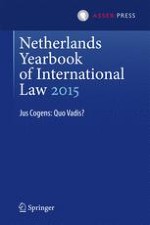2016 | OriginalPaper | Chapter
13. Immunities of International Organizations Before Domestic Courts: Reflections on the Collective Labour Case Against the European Patent Organization
Author : Cedric Ryngaert
Published in: Netherlands Yearbook of International Law 2015
Publisher: T.M.C. Asser Press
Activate our intelligent search to find suitable subject content or patents.
Select sections of text to find matching patents with Artificial Intelligence. powered by
Select sections of text to find additional relevant content using AI-assisted search. powered by
